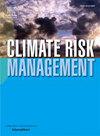气候变化对危地马拉的影响
IF 5
2区 环境科学与生态学
Q1 ENVIRONMENTAL SCIENCES
引用次数: 0
摘要
对气候变化的关注被认为能促进环境友好行为和支持改善环境的政策。因此,了解这种关切的原因是动员各国支持改善环境作法的先决条件。本文利用一项具有全国代表性的调查的实证结果,探讨危地马拉气候变化问题的相关关系。报告发现,气候影响的直接和间接经验是气候变化关注的主要相关因素。公众信任度低以及在应对灾害时缺乏能动性,也导致了人们的担忧程度。采取措施加强天气影响和人为活动与气候变化之间的联系,并培养公民的气候机构意识,可以通过创造更有利于环保行为和政策变化的条件,帮助危地马拉等高度脆弱的国家应对气候变化的挑战。本文章由计算机程序翻译,如有差异,请以英文原文为准。
The correlates of climate change concern in Guatemala
Climate change concern is believed to promote environmentally friendly behavior and the support of ameliorative environmental policies. Understanding the causes of this concern is therefore a precondition for its mobilization in favor of ameliorative environmental practices. This paper leverages empirical findings from a nationally representative survey to explore the correlates of climate change concern in Guatemala. It finds that direct and indirect experiences with climate impacts are the main correlates of climate change concern. Low levels of public trust and a sense of agency in reacting to disasters also contribute to concern levels. Measures taken to increase the linkage of weather impacts and anthropogenic actions to climate change, and to foster a sense of climate agency in citizens, can help highly vulnerable countries like Guatemala confront the challenges of climate change by contributing to create conditions that are more conducive to pro-environmental behavior and policy change.
求助全文
通过发布文献求助,成功后即可免费获取论文全文。
去求助
来源期刊

Climate Risk Management
Earth and Planetary Sciences-Atmospheric Science
CiteScore
8.20
自引率
4.50%
发文量
76
审稿时长
30 weeks
期刊介绍:
Climate Risk Management publishes original scientific contributions, state-of-the-art reviews and reports of practical experience on the use of knowledge and information regarding the consequences of climate variability and climate change in decision and policy making on climate change responses from the near- to long-term.
The concept of climate risk management refers to activities and methods that are used by individuals, organizations, and institutions to facilitate climate-resilient decision-making. Its objective is to promote sustainable development by maximizing the beneficial impacts of climate change responses and minimizing negative impacts across the full spectrum of geographies and sectors that are potentially affected by the changing climate.
 求助内容:
求助内容: 应助结果提醒方式:
应助结果提醒方式:


